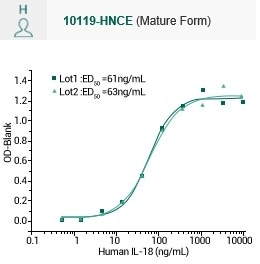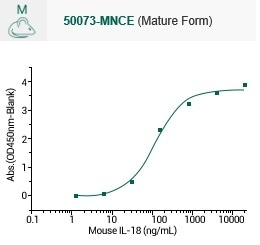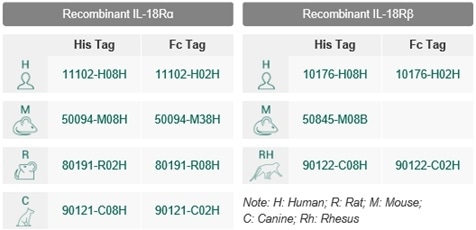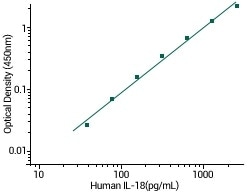The importance of the IL-18 pathway
Interleukin 18 (IL-18), also known as interferon-gamma inducing factor) is a pleiotropic pro-inflammatory cytokine belonging to the IL-1 superfamily.
Produced by antigen-presenting cells and T-cells, IL-18 mediates signaling; a key feature of immunomodulatory cytokine networks involved in inflammation, host defense and tissue regeneration.
Participating in both innate and acquired immunity, IL-18 mediates host immunity by regulating IFN-γ production in synergy with IL-12. IL18 also amplifies the innate immune response through other cytokines, such as GM-CSF, TNF-α and IL-1β.
IL-18 activates downstream signal transduction in a similar fashion as IL-1β. IL-18 binds with its receptor, IL-18 receptor α, to begin an intricate chain of molecular events involving a series of protein molecules.
Simply described, an accessory protein, IL-18Rβ, is recruited to the complex, and the downstream cellular signal is initiated through the activation of nuclear factor-κB. Negatively regulation of IL-18 signaling can occur through secretion of the antagonist receptor IL-18 binding protein (IL-18BP).
Implications in disease
The diverse roles it plays across many biological functions, IL-18—or more specifically, the signaling response it triggers—has been implicated in an array of pathological conditions. These include inflammatory diseases such as allergies, asthma, COPD, Crohn's disease, lupus erythematosus, hepatitis, multiple sclerosis and rheumatoid arthritis.
Overlapping the classification of inflammatory diseases, IL-18 is also involved in auto-immune diseases, metabolic disorders and cancers.
The role of IL-18 incancer is highly complex and studies have shown a dual effect of IL-18 on tumoral cells. The activity of IL-18 in immune responses suggests that it induces anti-tumorigenic effects. This has been borne out by evidence showing how IL-18 leads to tumor regression in animal models.
However, high serum levels of IL-18 found in certain cancers seem to imply that IL-18 has a pro-tumoral role. Indeed, this is supported by the observation that IL-18 suppresses CD70 and, thereby, enhances the ability of cancer cells to evade immune detection.
The complexity of the immune system interacting with other biological systems warrants further experimentation so thatconclusions can be drawn and turned towards therapeutic purposes.
Likewise, in a number of inflammatory diseases,it remains unclear whether IL-18 is a causative agent. Similarly, the role of IL-18 awaits resolution for auto-immune diseases where cytokine balance plays a key role in maintaining a healthy immune response.
However, in the case of auto-immune diseases such as type 1 diabetes mellitus, multiple sclerosis and rheumatoid arthritis, elevated levels of IL-18 are usually reported in disease patients.
Altogether, the presence of IL-18 in a panoply of diseases suggest an important role in disease development and progression, therefore warranting further scientific investigation.
There is strong biomedical importance in studying the IL-18 pathway. It can allow us to understand the mechanics behind diseases, which will aid our ability to design innovations to treat and diagnose diseases and contribute to our understanding of the field immunology.
Despite this imperative, detailed illumination of IL-18-mediated signaling events is lacking. To help address the deficits in our understanding of IL-18 signaling, Sino Biological has developed a panel of recombinant IL-18 and IL-18 receptor protein reagents.
The Sino Biological Research and Development Team has many years of experience in recombinant protein R&D.
Over the years, this team has generated more than 6,000 recombinant proteins currently in stock, covering research areas such as immune checkpoints, antibody drug targets, CAR-T cell therapy targets, Fc receptors, influenza viral proteins and cytokines.
These proteins and reagents are made to the highest standards and undergo stringent quality control measures. Accordingly, they exhibit high bioactivity, high purityand high batch-to-batch consistency. Furthermore, they are carrier-free (dissolved in PBS, without BSA) and qualified raw materials ensure animal-free production.
Recombinant IL-18 proteins
Sino Biological produces high bioactivity IL-18 proteins from multiple species: a human derivative (10119-HNCE (Mature Form)) and a mouse derivative (50073-MNCE (Mature Form)). The activity of these proteins has been validated in IFN-γ induction experiments and binding assays against the IL-18 receptors.
The 10119-HNCE (Mature Form) is available in 5 µg, 100 µg and 1 mg sizes, with bulk order inquiries available for all Sino Biological products. The 50073-MNCE (Mature Form) is available in 20 µg and 50 µg sizes.

Induce IFN Gamma Secretion. Image Credit: Sino Biological Inc.

Bind with IL-18RαL-18wi: 5009-M38H). Image Credit: Sino Biological Inc.
Recombinant IL-18 receptor protein reagents
Sino Biological also provides recombinant IL-18 receptors. As the IL-18 receptor complex is a heterodimer containing an α (IL-18Rα) chain responsible for extracellular binding of IL-18 and a non-binding, signal-transducing β (IL-18Rβ / IL-18RAcP) chain, Sino Biological provides recombinant IL-18Rα and recombinant IL-18Rβ.
Both of these chains are available in a range of sizes (20 µg to 1 mg) and are synthesized from a number of animals. The recombinant IL-18Rα is available as human, mouse, rat and canine derivatives with His Tag and Fc Tags available for all forms.
Similarly, the recombinant IL-18Rβ is produced as human, mouse and rhesus monkey derivatives with His Tags available for all derivatives and Fc Tags available for human and rhesus monkey derivatives.
Source: Sino Biological Inc.

Recombinant IL-18 antagonist and ELISA pair sets
Sino Biological also produces a recombinant IL-18 antagonist, derived from human (Isoform a: His Tags and Fc Tags are available) and mouse (Isoform d: His Tag is available). These are available in a range of sizes (5 µg to 1 mg). This antagonist specifically binds to and neutralizes the activity of IL-18.
In addition to proteins and reagents, Sino Biological has developed high sensitivity ELISA pair sets for the detection of IL-18. These include the Human IL-18 Matched ELISA Antibody Pair Set and a Mouse IL-18 Matched ELISA Antibody Pair Set, which are both available in 5 plate and 15 plate sizes.

Image Credit: Sino Biological Inc.
References

Sino Biological is an international reagent supplier and service provider. The company specializes in recombinant protein production and antibody development. All of Sino Biological's products are independently developed and produced, including recombinant proteins, antibodies and cDNA clones. Sino Biological is the researchers' one-stop technical services shop for the advanced technology platforms they need to make advancements. In addition, Sino Biological offer pharmaceutical companies and biotechnology firms pre-clinical production technology services for hundreds of monoclonal antibody drug candidates.
Sponsored Content Policy: News-Medical.net publishes articles and related content that may be derived from sources where we have existing commercial relationships, provided such content adds value to the core editorial ethos of News-Medical.Net which is to educate and inform site visitors interested in medical research, science, medical devices and treatments.